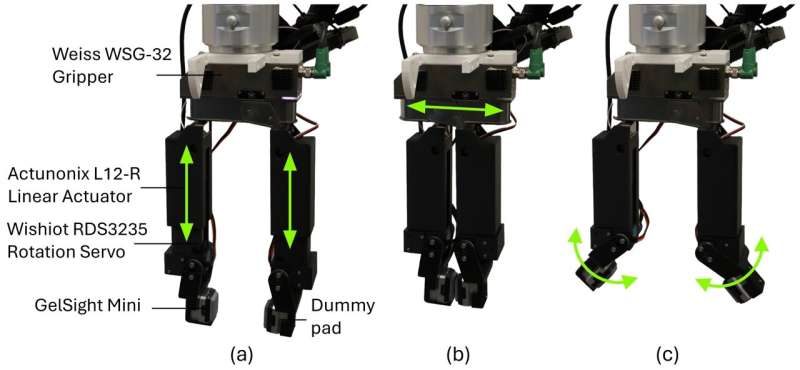
In recent years, roboticists worldwide have designed various robotic grippers that can pick up and manipulate different types of objects. The grippers that are most effective in tackling real-world manual tasks, particularly complex object manipulation tasks, are often those inspired by human hands.
Despite their typically good performance, many humanoid robotic hands rely on advanced and sometimes expensive mechanisms, as well as sophisticated programming tools. This could limit their large-scale deployment, as it makes them impractical in the development of energy-efficient and cost-effective robots.
Researchers at Purdue University and the Massachusetts Institute of Technology (MIT) recently developed a simpler and yet seemingly equally effective robotic gripper. This gripper, presented in a paper posted to the arXiv preprint server, was found to effectively tackle intricate object manipulation tasks, despite having fewer degrees of freedom (DOF) than grippers inspired by human hands.
“Conventional high DOF dexterous robotic hands can perform complex in-hand manipulation tasks but are non-trivial for programming/control due to their complex mechanisms,” Yu She, co-author of the paper, told Tech Xplore.
“In contrast, traditional one DOF parallel-jaw robotic grippers are easy for programming/control but are limited to grasping tasks and are challenging to perform in-hand manipulation. Our team aims to design a gripper that bridges the gap between these two types of grippers.”
The new gripper developed by She and his colleagues has 5 DOF. While its simple design makes it easier to control via programming tools, the gripper can still perform human-like in-hand manipulations, relying on sensory data recorded by an integrated vision-based tactile sensor.
The newly designed gripper essentially consists of two fingers attached to a gripper-base. Notably, the team also mounted a small vision-based tactile sensor at the top of the gripper’s left finger.

“The gripper base provides one DOF for closing and opening of the gripper,” She explained. “Each finger is equipped with a linear actuator and a rotational servo motor, providing a total of five DOFs of the gripper. The gripper’s fingers are fabricated from PLA material using 3D printing. A GelSight mini vision-based tactile sensor is mounted at the left fingertip, providing information about the geometry, orientation, and grip force of the grasped object.”
The characterizing feature of the gripper developed by She and his colleague is that while its movements can be easily controlled, it can still achieve a high level of dexterity during in-hand manipulation tasks by combining its 5 DOF.
The researchers evaluated the gripper in a series of initial real-world experiments and found that it reached beyond the basic manipulation skills of most simple grippers with a few DOF. The gripper could effectively complete two types of object manipulation known as singulation and scooping. For instance, it could mimic the human motion of rubbing away sand particles stuck between an object’s surface and its fingers, an action that humans might perform when they are picking up shells on the beach.
“We demonstrate that a gripper with fewer degrees of freedom than a humanoid robotic hand can successfully complete intricate in-hand manipulation tasks,” She said. “This reduction in complexity can lead to simpler controller design and more robust, cost-effective, energy-efficient robotic solutions that are easier to implement and maintain.”
The robotic gripper introduced by this research team could soon be developed further and applied to other complex object manipulation tasks. Its underlying design could also inspire the development of other similar robotic systems for object manipulation that are both cost-effective and efficient.
“We now plan to use the developed tactile gripper to accomplish more challenging manipulation tasks that are currently beyond the capabilities of other robotic grippers,” She added. “These tasks include, but are not limited to, the manipulation of deformable linear objects.”
More information:
Yuhao Zhou et al, In-Hand Singulation and Scooping Manipulation with a 5 DOF Tactile Gripper, arXiv (2024). DOI: 10.48550/arxiv.2408.00610
© 2024 Science X Network
Simplified robotic gripper can still tackle complex object manipulation tasks (2024, August 17)
retrieved 17 August 2024
from https://techxplore.com/news/2024-08-robotic-gripper-tackle-complex-tasks.html
part may be reproduced without the written permission. The content is provided for information purposes only.









